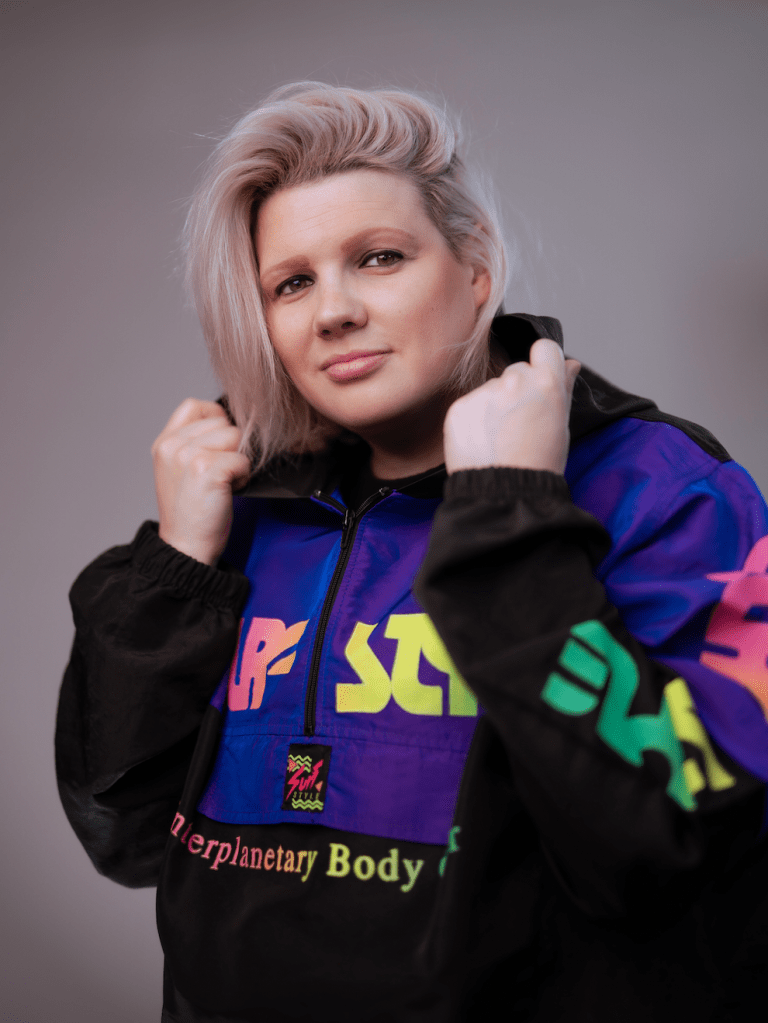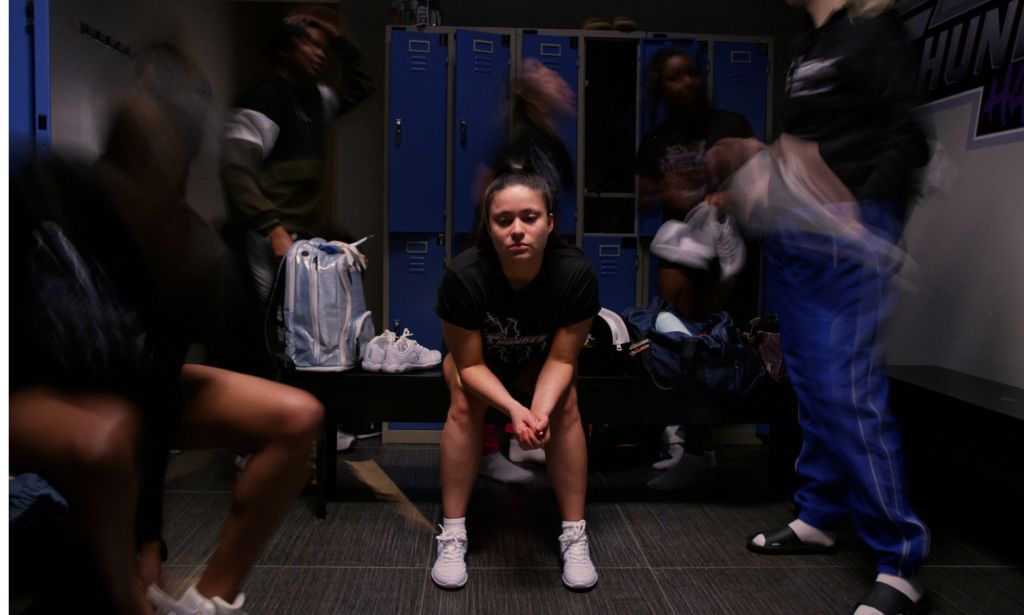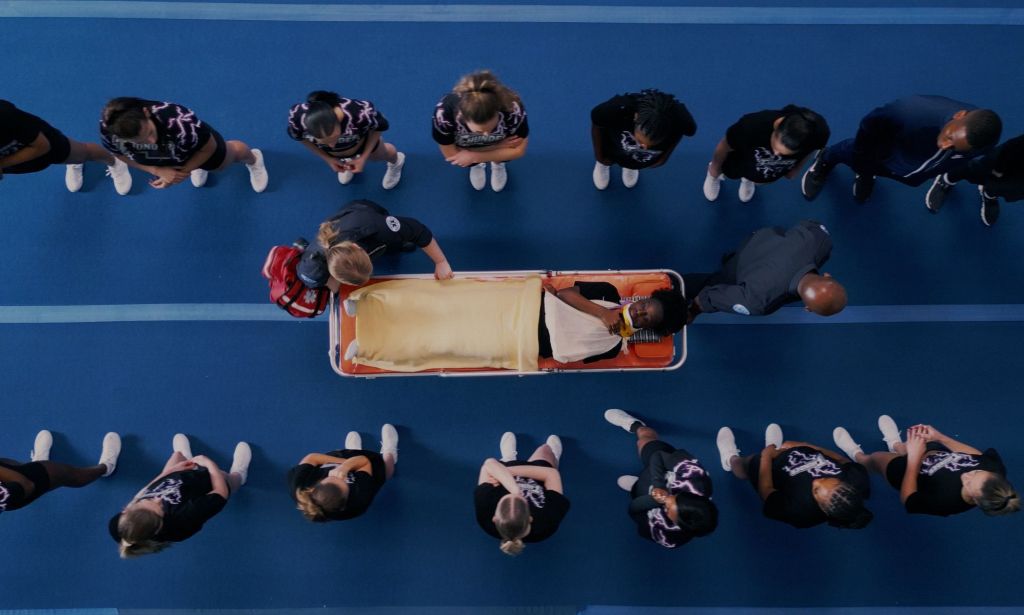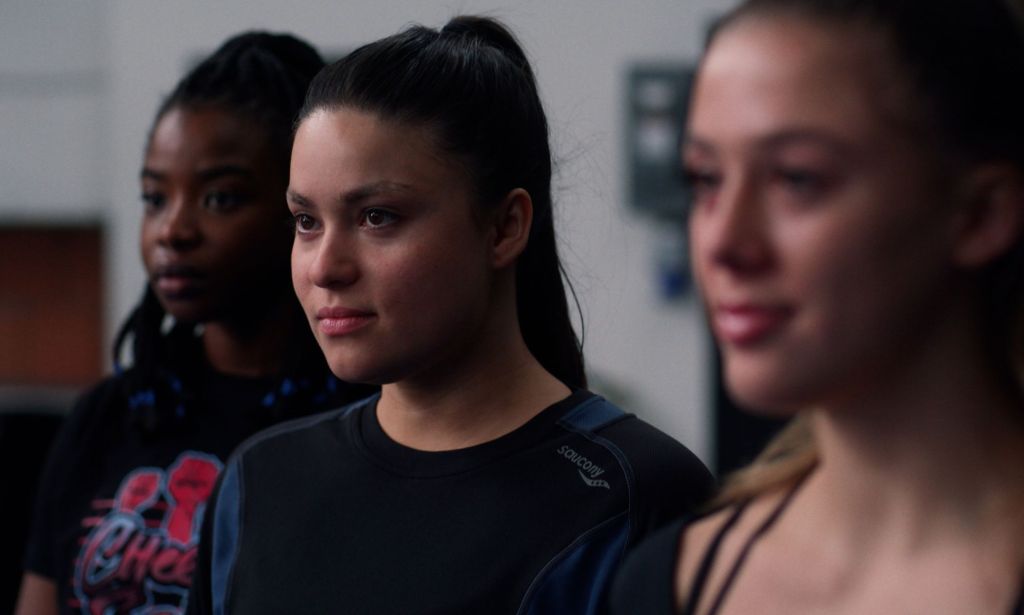Lesbian cheerleading drama Backspot is about to become your next sweaty sapphic obsession

Devery Jacobs plays Riley, a queer cheerleading fanatic in new film Backspot. (XYZ Films)
Devery Jacobs plays Riley, a queer cheerleading fanatic in new film Backspot. (XYZ Films)
“It was a very sweaty set,” laughs DW Waterson. The non-binary Canadian musician is talking to PinkNews about their new queer, coming-of-age sports film, Backspot.
It’s Waterson’s feature directorial debut, but that doesn’t mean Backspot is a small endeavour. The Umbrella Academy star Elliot Page is the executive producer and Westworld actress Evan Rachel Wood stars as Eileen, a hard-as-nails lesbian cheerleading coach.
The film has been in the works for more than six years.
Backspot follows Riley (Reservation Dogs’ Devery Jacobs), a young queer woman driven by her desire to join Eileen’s all-star cheerleading squad, the Thunderhawks.
After being accepted on to the team, her pursuit for success takes dark turns. She neglects her fellow cheerleader girlfriend Amanda (Kudakwashe Rutendo), risks serious physical injury and lets her mental health fall by the wayside.
Backed up by an electric soundtrack (featuring everything from “Perfect” by Princess Superstar, to Dexys Midnight Runners classic “Come On Eileen” and Waterson’s own music), some very sweaty stunts – most of which Jacobs, an athlete herself, performed – and fizzing tension between all involved, the drama is a heart-pumping love letter to cheerleading, drive and queer identity.

PinkNews: In the past couple of months, we’ve had Kristen Stewart’s sapphic bodybuilding tale Love Lies Bleeding, Zendaya’s bisexual tennis romp Challengers and now a lesbian cheerleading drama. Why do you think we’re in a queer sports film era?
Waterson: It’s that gay sweat! Everybody wants that gay sweat before Pride month.
And last year we had Bottoms too, which is less about the sport itself, but it’s definitely got lesbian cheerleaders involved. Everything is coming at once. Why do you think it’s taken so long to get queer women’s stories on the big screen?
I’m not sure. It’s pretty phenomenal seeing what Bottoms did last year, then Love Lies Bleeding. We feel in such a great position because it feels like we’re just keeping a conversation going. Obviously, there’s a huge audience for this content, whether it be queer women, or everybody else just wanting to see these awesome stories. It feels perfect that Backspot is coming out on the shoulders of these incredible films, to keep the hunger and the thirst alive for queer female stories.

I was thrilled to learn it would be hitting cinemas. It feels like a lot of queer stories go straight to streaming, rather than the big screen where they’re meant to be seen.
That was the approach I took in terms of putting the film together from a director’s standpoint. I wanted a loud soundtrack, spending a lot of time in sound design. I really do think creating theatrical experience is in the sound and the music. It’s crazy. It feels like I’m learning a lot about the industry through this process, and what I’m learning is it’s very difficult to get into theatres [cinemas] unless you’re a big-budget studio film. So, the fact that Backspot will be in selected theatres across North America is pretty cool.
This is a film about how intense cheerleading can be, but also Riley’s fixation on the sport and what that costs her. A lot of queer people have quite a complex relationship with sport, and haven’t found it a comfortable thing to get into. Did you consider that relationship when writing the film?
Everything is so divided and even now, with trans people in sports, it’s such a hot-button topic, which is unfortunate because, at the end of the day, if you’re an athlete, you’re an athlete, and it really shouldn’t matter what changing room you need to [use]. If you’re the best, you’re the best. It doesn’t matter who you’re competing against. In this film, it was the balance between me reflecting reality and also wanting to show the reality I want to exist. As a filmmaker, if you’re just reflecting all the hardship, then you’re just perpetuating that.

There were things that I wanted to explore like the queer relationship between coach Eileen and Riley, and how different generations of queer people don’t necessarily see the same things the same way, and how we can be kind of harmful to one another in the queer community. That was something that jumped out [at] me, I don’t think I’ve ever seen that on screen before. I wanted the conflict to be within the sport, I didn’t want it to be around parents not accepting kids for being out. I didn’t want it to be around bodies, I wanted to [focus on] how brutal cheerleading is.
Speaking of Eileen, Evan Rachel Wood plays the role of the ruthless cheerleading coach with stoicism, but with a hint of vulnerability too. How did she come on board?
The role was written for Evan. When [Elliot Page’s production company] Pageboy came on board, they were like, ‘Give us your top five dream people for Eileen’. For us, it was always Evan. We reached out to her team, we sent a beautiful letter… her team got back saying: ‘This seems like it would be a great fit for Evan’. Then Devery and I met her over Zoom and she wanted to chat about the script and meet. She was so lovely. Something that stuck me during that meeting was, she was like, ‘I remember when I was doing Thirteen and [actress] Holly Hunter, who was this big name, came on [and] took a chance on us and lifted us up’, and she was like: ‘This kind of reminds me of that, and I want to do that for this film’, which [was] incredible to hear.

We get to see Riley’s relationship develop with Eileen, and with her girlfriend Amanda, but one touching scene features her finding support from another cheerleading teacher, Devon. It’s a small moment, but it’s special. Why did you want that in there?
I think we all, as queer people, want someone to be tender with us. It’s such a beautiful scene that I think we all wish we had when we were teenagers, for a queer elder to be gentle but firm, and be uplifting. All of us agree it’s our favourite scene. It’s the climax for us emotionally.
Despite this being a film about the reality of cheerleading as a competitive sport, the ending is hopeful, warm. Why did you choose that?

Things are tough in the world. People are traumatised enough with the million things that are going on. I wanted to give the audience a moment to reflect and see a more positive way forward and see it as a healing journey. It’s easy to be like: ‘Cheerleading is brutal, and this coach is being emotionally abusive’, and maybe see the character crumble. But I wanted to show growth and [have] Riley realise that there is life beyond [it]. She can still love it, and she can still pursue it and still be incredible at it, but to take a step back and get a full picture to really reflect on who she is.
Backspot is in selected cinemas across North America from Friday (31 May).

